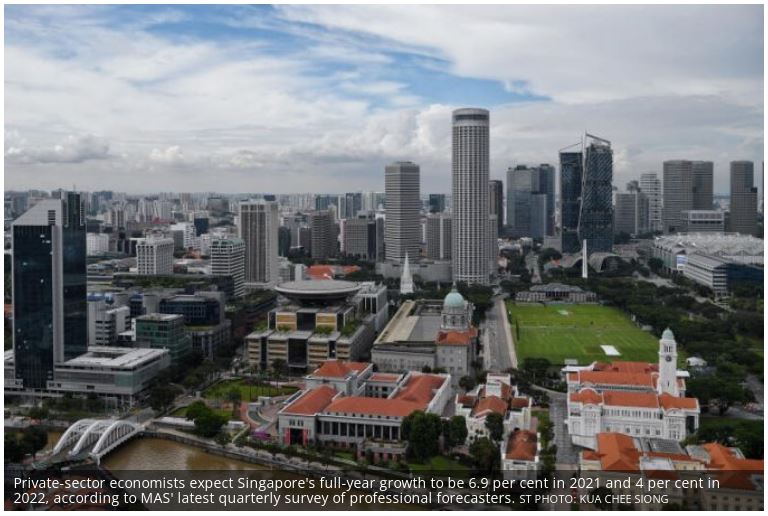Singapore to grow 6.9% in 2021, 4% in 2022: private-sector economists
PRIVATE-SECTOR economists expect Singapore’s full-year growth to be 6.9 per cent in 2021 and 4 per cent in 2022, according to the Monetary Authority of Singapore’s (MAS) latest quarterly survey of professional forecasters released on Wednesday (Dec 8).
This is comparable to the government’s forecasts of “around 7 per cent” for 2021, and 3 per cent to 5 per cent for 2022. For the fourth quarter, economists expect growth of 4.6 per cent year on year.
An escalation in the Covid-19 situation is still seen as the top downside risk, but concerns have increased over the risks of a China slowdown and global monetary policy tightening, with inflation expectations also rising.
The survey reflects the views of 22 economists and analysts, and not the MAS’s own views or forecasts.
The economists’ latest full-year forecast is a slight improvement from the 6.6 per cent figure in the last survey in September. Growth expectations have also risen for finance and insurance, construction, wholesale and retail trade, and non-oil domestic exports.
But they have halved for accommodation and food services, to 3.1 per cent, down from 5.9 per cent in September. Expectations also worsened for private consumption to 4.8 per cent growth, down from 5.6 per cent before.
In the labour market, the unemployment rate is expected to be 2.6 per cent at year-end, a slight improvement from the previous survey’s 2.7 per cent forecast.
Inflation expectations have risen, with economists expecting full-year headline inflation to be 2.1 per cent, up from 1.7 per cent in the September survey, and core inflation to be 0.9 per cent, up from 0.7 per cent before.
For the fourth quarter, headline and core inflation are expected to be 3 per cent and 1.5 per cent respectively.
In 2022, headline inflation is likely to be unchanged, but core inflation is expected to rise to 1.8 per cent.
Inflation has also emerged as one of the top 3 downside risks that respondents see for financial market and lending conditions in Singapore, cited by 25 per cent of economists.
The possibility of global financial conditions tightening remains the top risk, followed by an escalation of the Covid-19 pandemic.
Most respondents continue to expect corporate profitability to improve and private residential property prices to rise in 2022, but they were evenly divided on whether corporate bond spreads would widen, remain stable, or narrow.
For economic downside risks, Covid-19 escalation remains the most often cited, though no longer unanimously. Second is a slowdown in China, cited by two-thirds of respondents, up from less than a third in September.
Supply chain disruptions are no longer among the top 3 risks. Instead, monetary policy tightening – “arising, for instance, from a larger-than-expected pick-up in inflation”, said the MAS – has risen in economists’ estimation, with half of them citing it, up from 15 per cent previously.
As for upside risks to these forecasts, the reopening of borders remains top, cited by 77.8 per cent of respondents, up from 70 per cent in September.
A stronger-than-expected expansion in global manufacturing continues to be cited by about two-fifths of respondents, with a similar proportion citing stronger-than-expected global growth.
Source: https://www.businesstimes.com.sg/government-economy/singapore-to-grow-69-in-2021-4-in-2022-private-sector-economists


 Thailand
Thailand




